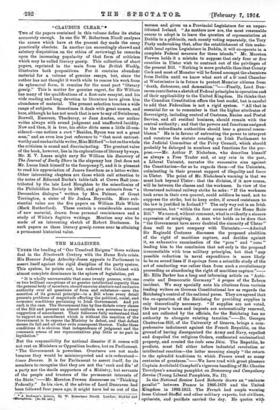"CLAUDIUS CLEAR." • Two of the papers contained in this
volume define its status accurately enough. In one Sir W. Robertson Nicoll analyses the causes which have at the present day made the essay practically obsolete. In another (an exceedingly shrewd and salutary disquisition on the ethics of reviewing) he remarks upon the increasing popularity of that form of criticism which may be called literary gossip. This collection of short papers, reprinted in the main from the British Weekly, illustrates both propositions. For it contains abundant material for a volume of genuine essays, but, since the author has not thought it worth while to rescue his work from its ephemeral form, it remains for the most part "literary gossip." This is matter for genuine regret, for Sir William has many of the qualifications of a first-rate essayist, and his wide reading and long devotion to literature have given him abundance of material. The present selection touches a wide range of subjects. Sometimes it deals with great names, and here, although he bee not much that is new to say of Swinburne, Boswell, Emerson, Thackeray, or Jane Austen, our author writes always with sound judgment and unaffected lucidity. Now and then, it is true, his obiter dicta seem a little ill-con. sidered—one notices a curt " Besides, Byron was not a great man," and an even less just reference to "that moat untrust- worthy and uncharitable writer, Miss Mitford"—but on th e whole the criticism is sound and discriminating. The greatest value of the book, however, lies in its explorations of literary byways. Mr. E. V. Lucas might envy Sir William his discovery of The Journal of Emily Shore in the sixpenny box (but does not Mr. Lucas limit himself to the fourpennyl"), and it is pleasant to read his appreciation of James Smetbam as a letter-writer. Other interesting chapters are those which call attention to the notes of Edmund Burke's table-talk at Crewe Hall (con- tributed by the late Lord Houghton to the miscellanies of the Philobiblion Society in 1863), and give extracts from "a Devonshire dialogue" written by Mrs. Palmer, of Great Torrington, a sister of Sir Joshua Reynolds. More sub- stantial value are the five papers on William Hale White (Mark Rutherford). These contain a considerable amount of new material, drawn from personal reminiscence and a study of White's fugitive writings. Mention may also be made of an interesting sketch of Robert Buchanan. In such papers as these literary gossip comes near to attaining a permanent historical value.










































 Previous page
Previous page